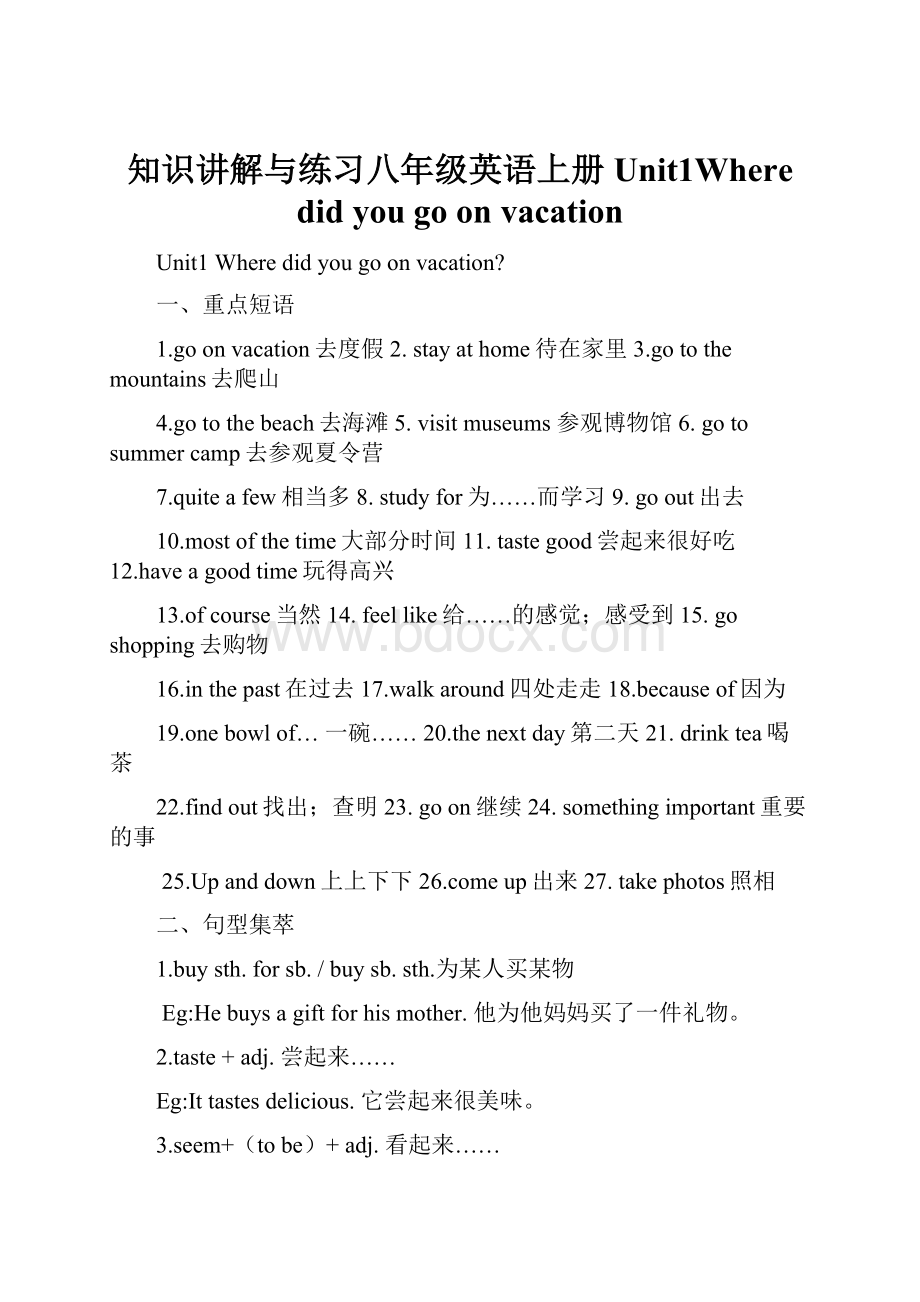知识讲解与练习八年级英语上册Unit1Where did you go on vacation.docx
《知识讲解与练习八年级英语上册Unit1Where did you go on vacation.docx》由会员分享,可在线阅读,更多相关《知识讲解与练习八年级英语上册Unit1Where did you go on vacation.docx(20页珍藏版)》请在冰豆网上搜索。

知识讲解与练习八年级英语上册Unit1Wheredidyougoonvacation
Unit1Wheredidyougoonvacation?
一、重点短语
1.goonvacation去度假2.stayathome待在家里3.gotothemountains去爬山
4.gotothebeach去海滩5.visitmuseums参观博物馆6.gotosummercamp去参观夏令营
7.quiteafew相当多8.studyfor为……而学习9.goout出去
10.mostofthetime大部分时间11.tastegood尝起来很好吃12.haveagoodtime玩得高兴
13.ofcourse当然14.feellike给……的感觉;感受到15.goshopping去购物
16.inthepast在过去17.walkaround四处走走18.becauseof因为
19.onebowlof…一碗……20.thenextday第二天21.drinktea喝茶
22.findout找出;查明23.goon继续24.somethingimportant重要的事
25.Upanddown上上下下eup出来27.takephotos照相
二、句型集萃
1.buysth.forsb./buysb.sth.为某人买某物
Eg:
Hebuysagiftforhismother.他为他妈妈买了一件礼物。
2.taste+adj.尝起来……
Eg:
Ittastesdelicious.它尝起来很美味。
3.seem+(tobe)+adj.看起来……
Eg:
Itseems(tobe)veryinteresting.看起来很有趣。
4.keepdoingsth.继续做某事
Eg:
Youcankeepdoinghomeworknow.你现在可以继续做作业了。
5.arrivein+大地点/arriveat+小地点到达某地
Eg:
IarrivedinBeijingyesterday.我昨天到达北京。
Iarriveathomeatfiveo'clockeveryday.我每天5点到家。
6.tellsb.(not)todosth.告诉某人(不要)做某事
Eg:
Mymothertellsmetogohomeontimeeveryday.我妈告诉我要每天按时到家。
7.trydoingsth.尝试做某事/trytodosth.尽力去做某事
Eg:
Youshouldtrywashingclothesbyyourself.你应该尝试自己洗衣服。
YoushouldtrytostudyEnglish.你应该尽力学英语。
8.decidetodosth.决定去做某事
Eg:
IdecidedtogotoBeijingforvacation.我决定去北京度假。
9.forgetdoingsth.忘记做过某事/forgettodosth.忘记做某事
Eg:
Iforgetdrinkingmilkthismorning.我忘了我今天早上喝过牛奶。
Iforgettobuysometomatoes.我忘记去买西红柿了。
10.enjoydoingsth.喜欢做某事
Eg:
Ienjoyreading.我喜欢阅读。
11.wanttodosth.想去做某事
Eg:
Iwanttobeanactor.我想成为一个演员。
12.stopdoingsth.停止做某事
Eg:
Stoptalking.停止说话。
13.dislikedoingsth.不喜欢做某事
Eg:
Idislikedrinkingmilk.我不喜欢和牛奶。
14.Whynotdo.sth.?
为什么不做……呢?
Eg:
Whynotgoforwalk?
为什么不去散步呢?
15.so+adj.+that如此……以至于……
Eg:
IamsotiredthatIwantgotosleepnow.
16.look+adj.看起来.....
Eg:
Itlooksverynice.它看起来很好。
17.startdoingsth.开始做某事
Eg:
Istartdoingmyhomeworknow,我现在开始做家庭作业。
三、单元重点、难点、考点精讲
(一)SectionA
1.Wheredidyougoonvacation?
你去哪里度假了?
(P1)
1)这是有疑问副词where引导的特殊疑问句,where用来询问地点和场所,放在句首。
a.Wheredoyoucomefrom?
你从哪里来?
b.Wheredoeshelive?
他住在哪里?
2)goonvacation意为“去度假”。
IwanttogoonvacationinHainanthiswinter.今年冬天我想去海南度假。
2.visitedmyuncle看望了我的叔叔(P1)
visit是及物动词,意为“拜访;探望”,后接表示人的名词或代词。
visit还可以意为“参观;游览”,后接表示地点的名词。
a.Ivisitedmygrandmotherlastweek.上周我去拜访了我的外婆。
b.DoyouwanttovisitShanghai?
你想参观上海吗?
拓展:
visitor意为“参观者;游客”。
Eg:
ThesevisitorscomefromAmerica.
3.buyanythingspecial买特别的东西。
(P2)
1)buy及物动词,意为“买;购买”。
其过去式为bought。
拓展:
buysth.forsb.=buysb.sth.意为“给某人买某物”。
Myunclebuymeabike.
=Myunclebuyabikeforme.
2)anything不定代词,意为“某事;某件东西”,主要用于疑问句或否定句中。
a.Doyouwantanythingfromme?
b.Ican’tsayanythingaboutit.
3)anythingspecial表示“特别的东西”,形容词修饰不定代词时后置。
a.Isthereanythingnewinthisbook?
这本书里有新的内容吗?
4.Oh,didyougoanywhereinteresting?
哦,你去有趣的地方了吗?
(P2)
1)本句是did开头的一般疑问句
2)anywhere用作副词,意为“在任何地方”。
Eg:
Didyougoanywhereduringthesummervacation?
辨析:
anywhere与somewhere
anywhere意为“在任何地方”,常用于否定句和疑问句中。
Eg:
Ican’tfinditanywhere.
somewhere意为“在某处;到某处”,常用于肯定句中。
Eg:
Ilostmykeysomewherenearhere.
5.Wetookquiteafewphotosthere.我们在那里拍了不少照片。
(P2)
takephotos意为“照相;拍照”。
Eg:
WetookphotosontheGreatWall.我们在长城上照了相。
辨析:
quiteafew与quitealittle
quiteafew意为“很多;不少”,修饰可数名词复数;
quitealittle意为“很多;不少”,修饰不可数名词。
a.Hestayshereforquiteafewdays.
b.Thereisquitealittlewaterinthebottle(瓶子).
6.Ijuststayedathomemostofthetimetoreadandrelax.我大部分时间只是待在家里读书休息。
(P2)
mostofthetime意为“大部分时间”,其中most为代词,意为“大部分;大多数”。
拓展:
mostof…意为“……中的大多数”,它作主语时,谓语动词取决于mostof后所修饰的名词。
a.Mostofusaregoingtothepark.我们大多数人要去公园。
b.Mostofthefoodgoesbad.大部分的食物都变质了。
7.Everythingtastedreallygood!
所有的东西尝起来真的很好吃!
(P3)
taste在此为系动词,意为“尝起来”,其后接形容词构成系表结构。
a.Thefoodtastesreallygreat.食物尝起来棒极了。
8.Dideveryonehaveagoodtime?
大家都玩得很开心吗?
(P3)
haveagoodtime=enjoyoneself=havefun玩得开心(+doing)
Eg:
WehadagoodtimevisitingthetheGreatWall.
=WeenjoyedourselvesvisitingthetheGreatWall.
=WehadfunvisitingthetheGreatWall.
9.Howdidyoulikeit?
你觉得它怎么样?
(P3)
Howdo/didyoulike……?
意为“你觉得……怎么样?
”,用来询问对方的观点或看法,相当于
Whatdoyouthinkof……?
Eg:
Howdoyoulikeyournewjob?
=Whatdoyouthinkofyournewjob?
10.Didyougoshopping?
你们去购物了吗?
(P3)
goshopping意为“去购物;去买东西”,同义短语为dosomeshopping.
Eg:
IusuallygoshoppingonSundays.我通常星期天去购物。
拓展:
“go+doing”形式表示“去做某事”,常用于表达从事某一体育活动或休闲活动。
goskating去滑冰gohiking去远足
gosightseeing去观光gofishing去钓鱼
goswimming去游泳goboating去划船
11.Iwenttoafriend’sfarminthecountrysidewithmyfamily.我和家人一起去了乡下一个朋友的农场。
(P3)
afriend’sfarm是名词所有格形式。
一般情况下,表示“有生命的人或物”的名词后面加’s,表示所属关系。
Eg:
TheredbikeisAlice’s.那辆红色的自行车是爱丽斯的。
拓展:
名词所有格的构成:
1)单数名词词尾加’s,复数名词词尾没有s,也要加’s
Eg:
thegirl‘spen女孩的钢笔women’sshoes女鞋onChildren’sDay
2)复数名词以s结尾的只加’
Eg:
thestudents’readingroom学生阅览室Teachers’Day教师节
3)如果两个名词并列,并且分别有’s,则表示“分别有”;只后一个名词有一个’s,则表示“共有”:
Eg:
John’sandKate’srooms.约翰和凯特(各自)的房间。
LilyandLucy’sfather.莉莉和露西的爸爸(同一个爸爸)。
4)表示无生命的名词一般以...of...构成短语,表示所有关系。
Eg:
amapofChina一幅中国地图thenameofthestory那个故事的名字
12.Stillnooneseemedtobebored.(即使这样)仍然没有人看起来无聊。
(P3)
1)seem意为“好像;似乎;看来”。
Eg:
Everythingseemseasy.一切似乎很容易。
拓展:
a.seem+adj.“看起来……”。
Youseemhappytoday.你今天看起来很高兴。
b.seem+todosth.“似乎,好像做某事”。
Iseemtohaveacold.我似乎感冒了。
c.Itseems/seemed+从句“看起来好像…;似乎…”。
Itseemsthatnoonebelievesyou.看起来好像没有人相信你。
2)辨析:
bored与boring
a.bored意为“厌烦的;感到无聊的”,一般在句中修饰人。
b.boring意为“无聊的;令人厌烦的”,一般在句中修饰事或物。
eg:
a.I’mboredwithwhathesaid.我对他说的话厌烦极了。
b.Ifindthestoryveryboring.我发现这个故事太无聊了。
(二)SectionB
1.Whatactivitiesdoyoufindenjoyable?
你发现什么活动让人快乐?
(P5)
1)activities是activity的复数形式,意为“活动”。
Eg:
Studentslikeoutdooractivities.
2)enjoyable形容词,意为“愉快的;快乐的”。
Eg:
I’msurewewillhaveanenjoyablevacation.我确信我们将会有一个愉快的假期。
2.IarrivedinPenanginMalaysiathismorningwithmyfamily.今天早上我和家人到达了马来西亚的槟城。
(P5)
arrive不及物动词,意为“到达”。
arrivein表示到达较大的地方,如国家、省、市等;arriveat表示到达较小的地方,如机场、商店、广场、村庄等。
(注:
地点副词home,here,there前介词省略)
辨析:
arrivein+大地点/arriveat+小地点
getto+地点
reach+地点
Eg:
Iarrivedatschoolat8:
00o’clockyesterday.
3.…sowedecidedtogotothebeachnearourhotel…因此我们决定到旅馆附近的海滩上去。
(P5)
decidetodosth.意为“决定做某事”。
Eg:
Theydecidetogotothemuseum.他们决定去参观博物馆。
拓展:
decide后常跟“疑问词+动词不定式”做宾语。
Hecan’tdecidewhentoleave.他不能决定何时动身。
4.MysisterandItriedparagliding.姐姐和我尝试了滑翔伞运动。
(P5)
try此处用作及物动词,其后常接名词、动名词或不定式,意为“尝试;试图,设法;努力”
Sheistryingmybicycle.她正在试骑我的自行车。
拓展:
try也可用作名词,意为“尝试”,常用短语“haveatry”,意为“试一试”。
Iwanttohaveatry.我想试一试。
辨析:
trydoingsth./trytodosth.
1)trydoingsth.尝试做某事,表示一种尝试、做做看的想法,不一定付出很多努力。
2)trytodosth.尽力设法去做某事,表示想尽一切办法要把事情办成,强调付出努力设法去完成。
a.Itrycallinghim,butnooneanswered.我试着给他打电话了,但没有人接听。
b.I’mtrytostudyEnglishwell.我正尽力把英语学好。
5.IfeltlikeIwasabird.Itwassoexciting!
我感觉自己就像一只小鸟。
太刺激了!
(P5)
1)feellike意为“给……的感觉;感受到”。
其后常接从句。
Eg:
Hefeelslikeheisswimming.他感觉像在游泳一样。
拓展:
feellike还可意为“想要……”,其后可接名词、代词或动名词。
即:
feellikesth.想要某物
feellikedoingsth.想要做某事
Eg:
Doyoufeellikeacupofteanow?
你现在想要一杯茶吗?
Doyoufeellike______(take)awalkintheparkwithme?
你想跟我在公园散步吗?
2)辨析:
exciting与excited
exciting意为“令人兴奋的,使人激动的”,一般修饰某物。
excited意为“感到兴奋的,激动的”,一般修饰某人。
Eg:
a.Thestoryis_________(exciting,excited).
b.Hetoldmethe_______(exciting,excited)news.
c.Sarahwas_______(exciting,excited)toseethesinger.
6.Therearealotofnewbuildingsnow…现在有许多新的建筑物……(P5)
building可数名词,意为“建筑物;楼房”。
build动词,“建造,建筑”(built,built),
7.Iwonderwhatlifewaslikehereinthepast.我想知道在这儿过去的生活是什么样的。
(P5)
wonder此处是及物动词,意为“想知道;琢磨”。
其后常接who,what,why等疑问词引导的宾语从句。
Eg:
1.Iwonder_______________.我想知道那个男孩是谁。
A.theboyiswhoB.whotheboyis
2.Iwonderwhattheyweredoinghere.我想知道他去哪里了。
8.Ireallyenjoyedwalkingaroundthetown.我真的很喜欢在镇上到处走走。
(P5)
1)enjoy及物动词,意为“喜爱;欣赏;享受……的乐趣”,其后接名词,代词或动名词作宾语。
a.Doyouenjoyyourjob?
你喜欢你的工作吗?
b.Ienjoyreadingbooks.我喜欢读书。
(enjoydoingsth.喜欢做某事)
拓展:
enjoyoneself=haveagoodtime=havefun玩得开心(+doingsth.)
2)walkaround意为“四处走走”。
He’sjustwalkingaroundthevillage.他只是在村庄里随便走走。
9.Whatadifferenceadaymakes!
一天的变化有多大呀!
(P5)
difference可数名词,意为“差别,差异”;其形容词形式为different,意为“不同的;有差异的”。
Eg:
a.Whatisthedifferencebetweenthisbookandthatbook?
b.Myschoolbagisdifferentfromyours.(bedifferentfrom意为“与……不同”)
10.Wewantedtowalkuptothetop,butthenitstartedrainingalittlesowedecidedtotakethetrain.(P5)
1)wanttodosth.意为“想要做某事”。
2)startdoingsth.意为“开始做某事”,同义短语:
starttodosth.
Eg:
TomstartedlearningEnglishlastyear.
3)alittle意为“一点儿”,在句中修饰动词、形容词或副词。
也可以修饰不可数名词。
Eg:
a.Icandrawalittle,butonlyasahobby.______________________________
b.It’salittlecoldoutside.______________________________
c.HecanspeakalittleEnglish.______________________________
4)takethetrain意为“乘火车”,take在此意为“乘坐”。
11.Wewaitedoveranhourforthetrainbecausethereweretoomanypeople.因为人太多,所以我们等了一个
多小时的火车。
(P5)
1)waitfor意为“等候”,其后可接人或物。
Tomwaswaitingforabusoverthere.
2)over介词,意为“多于;超过”,相当于morethan。
Eg:
Myfatherisover40yearsold.
Thereareovereighthundredstudentsinourschool.
3)toomany意为“太多”,其后接可数名词复数。
Healwayshastoomanyquestionstoaskme.
辨析:
toomany+可数名词复数意为“太多...”
toomuch+不可数名词意为“太多...”
muchtoo+形容词意为“太...”
Eg:
Ihavetoomuchhomeworktodotoday.
12.Andbecauseofthebadweather,wecouldn’tseeanythingbelow.而且因为坏天气,我们也没能看到下面的
任何景色(P5)
辨析:
becauseof与because
a.becauseof意为“因为,由于”,后可接名词、代词或动名词,不能接句子。
Helosthisjobbecauseofhisage.
b.because意为“因为”,引导状语从句,即接句子。